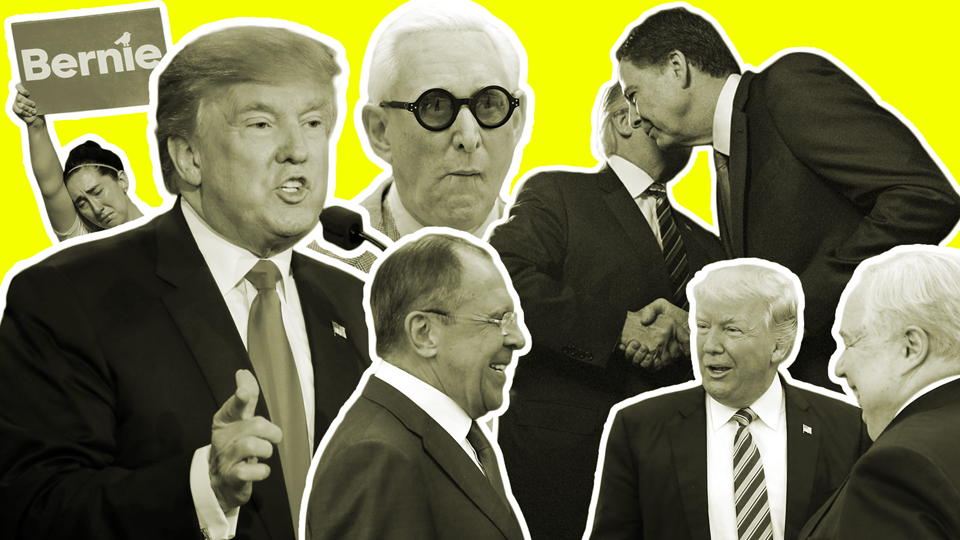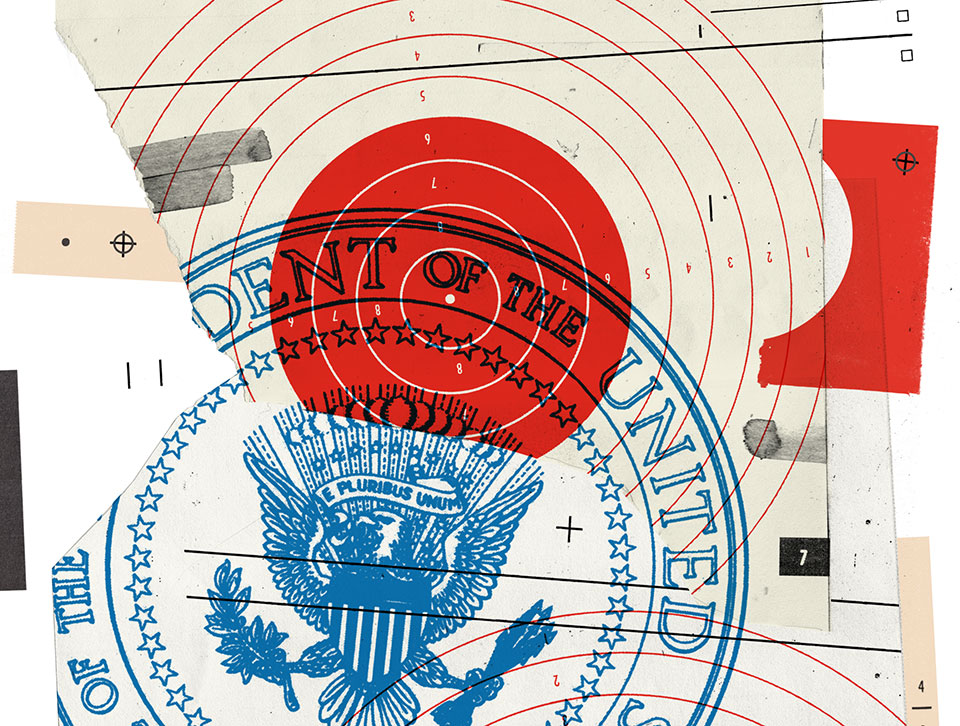The
Trump-Russia scandal
is the subject of multiple
investigations that
may or may not unearth new revelations, but this much is already
certain: Donald Trump is guilty.
We
don’t need additional information about the Russian covert scheme
to undermine the 2016 campaign, or about the curious interactions
between Team Trump and Russia,
or about Trump pressuring
and then firing FBI
Director James Comey, to reach the judgment that the president of the
United States engaged in wrongdoing.
From
the start, Trump and his crew have claimed they had nothing to do
with the hack-and-leak operation mounted by Russian intelligence to
help Trump nab the presidency. They have dismissed the matter as
fake news,
and they have insisted there is no issue because there has been no
proof that the Trump campaign conspired with Russia. In May, for
instance, Trump
proclaimed,
“Believe me, there’s no collusion.” Nothing to see; move along.
Explicit
collusion may yet be proved by the FBI investigation overseen
by special
counsel Robert Mueller or
by other ongoing probes. But even if it is not, a harsh verdict can
be pronounced: Trump actively and enthusiastically aided and abetted
Russian President Vladimir Putin’s plot against America. This is
the scandal. It already exists—in plain sight.
As
soon as the news
broke a year ago that
the Russians had penetrated the Democratic National Committee’s
computer systems, Trump launched a campaign of denial and
distraction. For months, he refused to acknowledge the Kremlin’s
role. He questioned expert and government findings that pinned the
blame on Moscow. He refused to condemn Putin. Far from treating these
acts of information warfare seriously, he attempted to politicize and
delegitimize the evidence. Meanwhile, he and his supporters
encouraged more Russian hacking. All told, Trump provided cover for a
foreign government’s attempt to undermine American democracy.
Through a propaganda campaign of his own, he helped Russia get away
with it. As James Clapper, the former director of national
intelligence, testified
to Congress this spring,
Trump “helps the Russians by obfuscating who was actually
responsible.”
On
June 15, 2016, the day after the Washington
Post reported
that the DNC had been hacked and that cybersecurity
experts had identified two groups linked
to the Russian government as the perps, Trump’s campaign issued
a statement blaming the victim:
“We believe it was the DNC that did the ‘hacking’ as a way to
distract from the many issues facing their deeply flawed candidate
and failed party leader.” The intent was obvious: to impede somber
consideration of the Russian intervention, to have voters and
reporters see it as just another silly political hullabaloo.In the following weeks, Trump continued to claim the Russia story was fiction. After WikiLeaks dumped nearly 20,000 DNC emails—a move that nearly blew up the Democratic convention—Trump tweeted, “The new joke in town is that Russia leaked the disastrous DNC e-mails, which should never have been written (stupid), because Putin likes me.” Two days later, he proclaimed at a news conference, “Russia, if you’re listening, I hope you’re able to find the 30,000 emails that are missing. I think you will probably be rewarded mightily by our press.” Trump supporters including Rep. Mike Pompeo, who would become Trump’s CIA director, and Roger Stone, the longtime political dirty trickster, cheered on WikiLeaks.
What
could be better for Putin? The US government had called him out—yet
Trump was discrediting this conclusion.
By
midsummer, numerous cyber experts had bolstered
the conclusion that
Russia was behind the hacks. And President Barack Obama echoed
those findings.
So anyone paying attention to the facts—say, a presidential
candidate and his advisers—would have been aware of this
fundamental point. Indeed, in August, during his first intelligence
briefing as the Republican presidential nominee, Trump
was reportedly told that
there were direct links between the hacks and the Russian government.
Still,
he didn’t change his tune. During a September
8 interview with RT,
the Kremlin-controlled broadcaster that has been accused of
disseminating fake news and propaganda, Trump discounted the Russian
connection: “I think maybe the Democrats are putting that out. Who
knows, but I think it’s pretty unlikely.” (Yes, he did this on
RT.) He repeated a similar line at the first presidential debate at
the end of that month, with his famous
reference to
how the DNC hacker “could be somebody sitting on their bed that
weighs 400 pounds, okay?”Private experts and US intelligence had already determined that Russia had pulled off this caper. Trump had been told this. Yet he continued to deny Russia’s culpability, actively protecting Moscow.
Many Republicans followed his lead. Trump’s stance—treating a widely shared conclusion as controversial speculation—essentially foreclosed a vigorous and bipartisan response to the Moscow intervention. It is hard to imagine how this did not embolden Russian intelligence and reinforce Putin’s belief that he had backed the right horse.
On October 7, the Department of Homeland Security and the Office of the Director of National Intelligence blew the whistle on Moscow, issuing a statement that the DNC hack and related cyberattacks had been authorized by “Russia’s senior-most officials.” Yet Trump remained on the side of the enemy. That same day, the now notorious grab-them-by-the-pussy video surfaced—and less than an hour after that story broke, WikiLeaks began releasing thousands of stolen emails from John Podesta, the Clinton campaign’s chairman. Trump’s response, at the second presidential debate: “I notice, anytime anything wrong happens, they like to say ‘the Russians.’ Well, [Hillary Clinton] doesn’t know if it’s the Russians doing the hacking. Maybe there is no hacking.” The next day at a campaign rally, Trump, citing some of the Podesta emails, exclaimed, “I love WikiLeaks!”
Trump
continued calling the Russia story a hoax, asserting that the hacks
might have been waged by China or others. And he still showed no
signs of confronting Putin.
What
could be better for Putin? The US government had called him out, yet
the GOP presidential candidate was discrediting this conclusion.
Trump made it tougher for Obama and the White House to denounce Putin
publicly—to do so, they feared, would give Trump cause to argue
they were trying to rig the election against him.
After
the election, he maintained this stance. “It’s time for the
country to move on,” he
said in December.
Two weeks later, after the US intelligence establishment released
a report concluding
Putin had implemented this covert op to install Trump in the White
House, the president-elect compared the intelligence community to
Nazi Germany. Though he did at
one point concede Russia was the culprit,
Trump continued calling the Russia story a hoax whipped up by
Democrats and eventually reverted to form, asserting that the hacks
might have been waged by China or others. And he still showed no
signs of confronting Putin. At the Russian leader’s request, he
jovially hosted the Russian foreign minister and ambassador in the
Oval Office—and then disclosed
top-secret information to them.
Moreover, he did this the day after brazenly ousting Comey, who was
overseeing the bureau’s probe of Moscow’s meddling and links
between Trump associates and Russia.
This country needs a thorough and public investigation to sort out how the Russian operation worked, how US intelligence and the Obama administration responded, and how Trump and his associates interacted with Russia and WikiLeaks. But whatever happened out of public view, the existing record is already conclusively shameful. Trump and his crew were active enablers of Putin’s operation to subvert an American election. That is fire, not smoke. That is scandal enough.




No comments:
Post a Comment